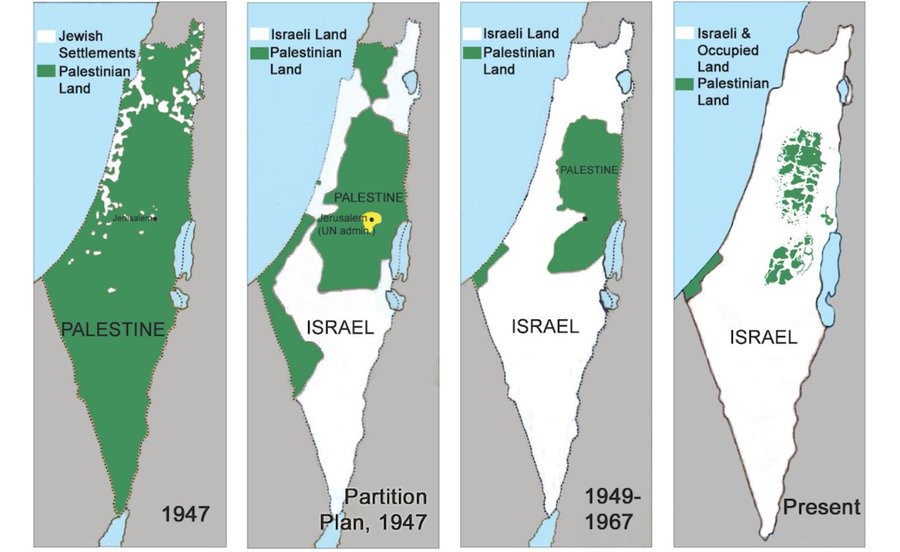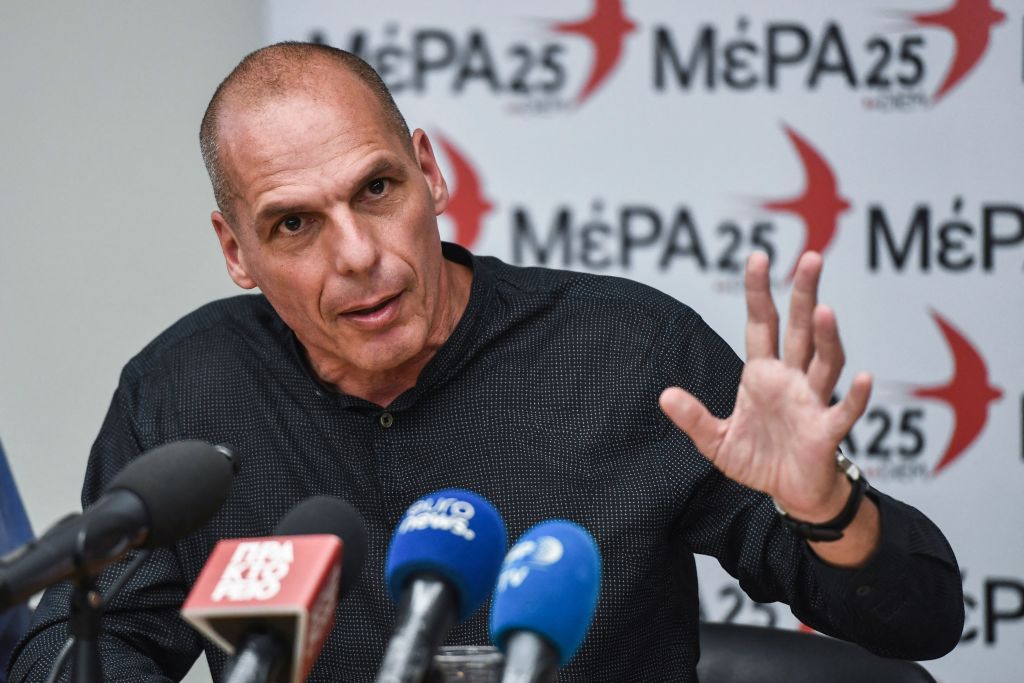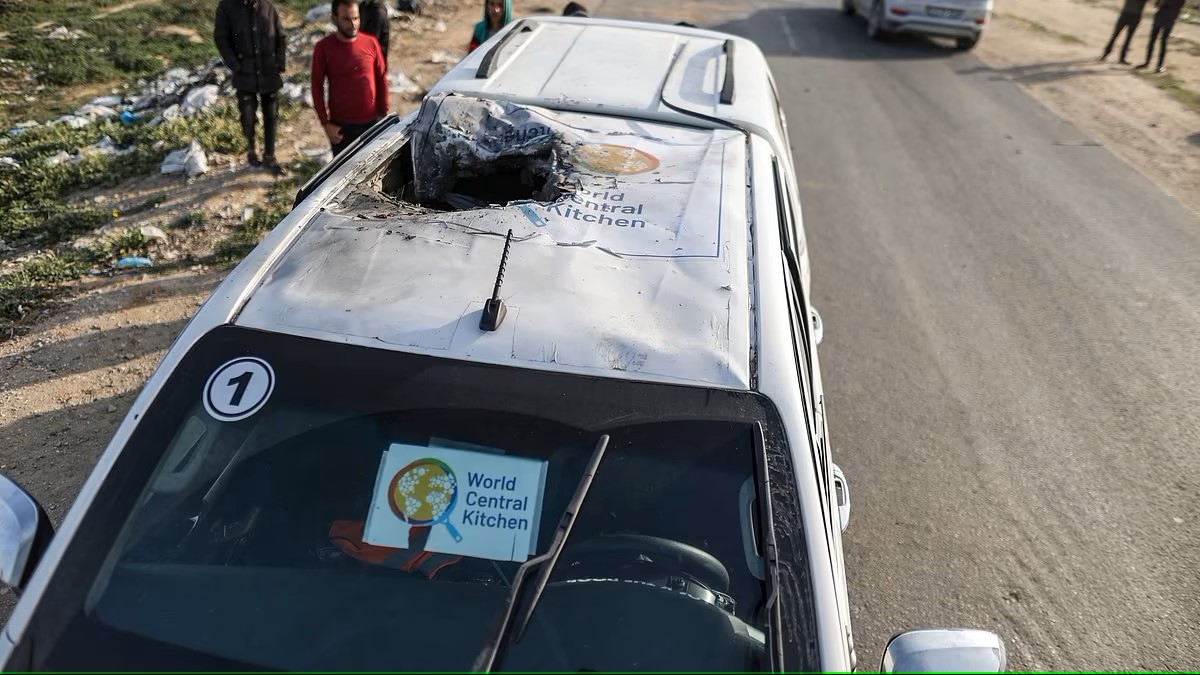It’s a fallacy, a false conclusion resulting from an implicit flawed reasoning, misleading: “if we do a little for each, it is easier to achieve, because it is a more moderate and fair solution.”
First of all, is it a “fair solution”? We must consider the historical causes of the present. Nor is there validity in the urging to focus only on the present: by what well-considered general criterion should we, in this case, leave the past behind and consider only the present, if otherwise we do nothing but insist, even obsessively, on the moral obligation of memory?
The historical causes of this tragic present have colonial roots, as Professor Diana Carminati from the University of Turin reminds us, among others.
We can no longer ignore the myriad of acts committed by the State of Israel in violation of the rights of the Palestinians and International Humanitarian Law. The causes, the origin in fact informs us about the current nature and structure of the state born from that colonial act, which continues to be perpetuated.
For years, generous activists have participated in olive harvests or defended Palestinian wells or homes, sometimes at the cost of their lives – like Rachel Corrie and Tom Horindal – accompanying Palestinian children to school and serving as human shields to curb the violence from settlers and Israeli soldiers.
For years, throngs of international volunteers have demonstrated in weekly mobilizations with the residents of villages threatened by the looming “apartheid wall.”
We watched with bated breath as endless and interminable lawsuits were filed in Israeli courts by Palestinian communities harmed by its relentless progression, despite being declared illegal by the International Court of Justice as early as July 9, 2004.
Back then, many of us did not fully understand the context in which the numerous abuses and repeated acts of violence we often witnessed on trips that allowed us to become witnesses fit. Nor was it clear to us the level on which to adequately support Palestinian claims, which could not be limited to merely trying to provide a breath of fresh air, without questioning the State of Israel.
The year following the ICJ ruling, since no action had been taken, the Palestinian-led Boycott, Divestment, and Sanctions (BDS) campaign against Israel was launched on July 9, 2005. Its three core objectives demonstrated an understanding of the overall strategy required: it was essential to no longer accept the fragmentation of the Palestinian people as sanctioned by the Oslo Accords. Freedom, end of the occupation of Arab lands (including the Syrian Golan). Equality, end of internal apartheid in Israel with the recognition of full citizenship for all citizens. Return, implementation of UN Resolution 194/1948 concerning each Palestinian expelled during the Nakba (1948) and those who ended up outside Palestine (consider, for example, the dire situation of Palestinian refugees in camps in Lebanon).
For those who had previously struggled to identify the causes and nature of Israeli violence, the enactment of the “Nation State Law” in July 2018 should no longer allow for the understatement of the restrictive use of the term “Jewish” previously associated with “State” when discussing Israel, without understanding its political implications. Therefore, it is not legitimate to completely ignore the historical origins of this state because it is connected to the problem of its nature.
For years now, respected experts from various backgrounds have recognized the “apartheid regime” that the State of Israel has established. South Africa was the first to denounce it, back in 2009. The evidence of the facts and the comparison with international legislation and the definition of apartheid, as well as with rights considered universal even by common sense, have led to the overcoming of taboos used as sentinels guarding against racist dangers (and scattered to prevent a clear view of the colonial reality). Thus, we can finally understand what Miko Peled asserts in a video recorded after last October 7: Israel is an apartheid state that has carried out policies of ethnic cleansing and occupies Palestinian land, concluding that it is not those who resist oppression who should be condemned, but the oppressor.
Is apartheid acceptable if it is limited to being internal to the State of Israel, unlike the decision made for South Africa? Equity is achieving equal rights within the current State of Israel for all its citizens, including those Palestinians, referred to as “Arabs” to obscure the fact that they are the natives.
Ignoring the nature and significant context of Israeli violence is not even effective: merely aiding the Palestinians who are victims of it is insufficient, as their cause continues to generate such violence without an end. Can the “two-state solution” put an end to this?
Since 1948, Israel has continued to encroach upon new lands taken from the Palestinians. The Palestinian commemoration of “Land Day” originates from this Israeli practice of continuously seizing Palestinian land, which occurred once again within the State of Israel itself. It was 1976 when the state decided to expropriate 21,000 dunams (approximately 5,189 acres) in Galilee, and the police response to protest demonstrations in the towns of Sakhnin, Arraba, and Deir Hanna was to kill six young people and injure others. Thus, whether inside or outside Israel, Palestinian property rights have not been and are not secured due to the nature of this state as a settler colony. Even today, as it conducts a terrible genocide in Gaza under the eyes of the world, the Israeli government announces the construction of additional homes in settlements. Since the end of the 1967 war, Israel has proceeded at an increasingly rapid pace to colonize the territories it had occupied, despite this being prohibited by international law. No one has prevented it!
Moreover, Israeli settlements have been considered one of the main obstacles to the successful outcome of the Oslo Accords, which envisioned a five-year process leading to the establishment of a Palestinian state alongside Israel.
“The settlers in Palestine number 464,400, or 14% of the population living in Palestinian territory (excluding Gaza and East Jerusalem). Additionally, in East Jerusalem, occupied by Israel after 1967, there are 14 entirely Israeli neighborhoods, totaling 230,000 inhabitants.”
Which states today have the political will and strength to compel Israel to dismantle the settlements to allow for the creation of the State of Palestine?
Has the “moderate solution” achieved results? The colonization has progressively intensified and has also involved what should be the capital of the prospective state: East Jerusalem. Therefore, two fundamental issues left unresolved by the Accords have also worsened. This also applies to the borders, which are even harder to define given the illegitimate incorporations into the “illegal wall” and the continual expansion of illegal settlements.
On the sovereignty over resources, even the EU has fallen short, called upon by the Palestinians for energy agreements with Israel that did not ensure that gas was not plundered from submarine deposits in Palestinian waters. Moreover, the European Union has committed for years, albeit with little courage, to distinguish in trade between the colonies and Israeli territories, no longer allowing products from the settlements to benefit from the favorable customs conditions granted to Israeli products, in order not to be officially complicit in the illegal colonization.
On the matter of defense, which any state must be able to ensure, there were no agreements, except for the temporary “security collaboration” between the Palestinian National Authority (PNA) established by the Oslo Accords and the Israeli state. The outcomes of this agreement have been repeatedly denounced by the Palestinians, who found themselves facing not only the forces of the occupier but also their own Palestinian forces during political protests. The Israeli state has since resumed control over the entire territory and has never respected the exclusivity of surveillance entrusted to the Palestinian forces in the few areas declared under full Palestinian control (Area A).
For several years now, it has been explicitly acknowledged, visible to all and borne by the Palestinians: the Oslo Accords have decisively failed. Signed in 1993 to realize the “two-state solution,” they failed to achieve their objective within the prescribed five years, nor were these goals met by the Oslo II Accords of 1995, which granted the PLO governance over several cities and villages in Gaza and the West Bank, with a partial withdrawal of the Israeli army. Some central issues remained unresolved: the borders of the two states, the right of return for Palestinian refugees as decreed by UN Resolution 194 of 1948, Jerusalem, defense of the Palestinian state, and resource management—all points that today seem even more problematic than in the past.
Among the reasons for the failure of the Oslo Accords, it was considered that the mediators of the time, particularly the United States, were unreliable in their role due to their strong ties with Israel. This aspect does not seem to have improved; rather, the USA has repeatedly exercised its veto at the UN even in the face of the ongoing genocide in Gaza. Their very recent abstention allowed for the adoption, after four unsuccessful attempts and six months of bombings, of the Resolution on March 25, 2024, for an immediate ceasefire and the release of Israeli hostages. However, it does not significantly impact the reality of the situation in Gaza, as the United States continues to send weapons to Israel, allowing their use to massacre the population of Gaza. The population to which Israel is preventing the delivery of humanitarian aid sent to them and which is therefore dying of hunger in the north of the Gaza Strip. The approved Resolution does not foresee any sanctions.
The “moderation,” or supposed such, has not paid off; it has not allowed the achievement of the objective, although it had the merit of leaving the Israeli state as it is, a limitation aprioristically incorporated into the solution itself.
Why propose today what did not work yesterday and for thirty years? Is there something to learn from past failures?
It’s likely that the approach failed precisely because the “solution” sought did not address the core of the problem: the nature of the State of Israel. If this nature was not clear then, it is very evident today and can no longer be avoided. The BDS movement was and is right: the core is the unity of the Palestinian people.
Today, the main proponents of the “two-state solution” are primarily states and supranational institutions: Guterres, the EU, the USA, Russia, Brazil, but also some Italian civil society organizations like the Italian Network for Peace and Disarmament and the association Schierarsi.
A prominent member of the Middle East and North Africa program at the European Council on Foreign Relations, Hugh Lovatt, has urged to “reset the ‘post-Oslo’ paradigm to focus on the liberation of the territories and equality of rights. This does not mean discarding the possibility of a two-state solution outright, but Europe must be clear that if Israel continues to block this option, then it must ensure equal rights in a single democratic state. In any case, European leaders must unequivocally affirm that the current situation of escalating apartheid cannot be the solution. (…) Europe has preferred to shift its political weight in support of defending the provisional framework established by the 1993 Oslo Accords, which was supposed to serve only as a springboard towards a different political agreement.”
Indeed, the establishment of two states in Palestine could necessitate the long-term presence of an international peacekeeping force, given the complexities and ongoing conflicts in the region. Haneen Zoabi, a former Palestinian parliamentarian from Nazareth in the Knesset, highlighted in an interview with Miko Peled that the signing of the Oslo Accords left Palestinian citizens of Israel feeling abandoned. Similarly, renowned Palestinian politician Hanan Ashrawi has echoed this sentiment, emphasizing that Palestinians seek national unity. This unity is evident in both Gaza and the West Bank, where armed resistance is conducted collectively by various Palestinian groups.
This call for unity among Palestinians aligns with the heart of the problem identified in the 2017 ESCWA report, which stated that Israel has imposed an apartheid regime on the entire Palestinian people and that “strategic fragmentation of the Palestinian people is the principal method by which Israel imposes an apartheid regime.” Thus, the Palestinian intention to reestablish conditions of unity addresses the essence of the problem.
The consequence of the error identified by Hugh Lovatt in European policies—that of clinging to formulas that should have evolved in the dynamic process of negotiation and conflict—thus preventing transformation and favoring the deterioration of the current situation, represents one of the most serious dangers in persisting with the “two people, two states” formula.
Channeling efforts in the wrong direction can divert them from more viable objectives, sterilize efforts, and potentially lead to implosion. Insisting on an unachievable goal can create a mental block and a compulsive repetition, spinning wheels on irrelevant details.
As the causes that have prevented the establishment of a Palestinian state on a small portion of Palestine have persisted and even strengthened, it is almost certain that the goal would not be achieved for decades. This risks wasting creative energy, organizational effort, emotional investment, economic resources, and mobilization capacity in a futile pursuit of the unattainable. Moreover, the predictable consequences of disappointment and demotivation could further damage the cause, despite efforts being “moderate” and unsatisfying.
Furthermore, the notion of a solution based on supposed ethnic homogeneity is theoretically contradictory to the democratic perspective, which has been solidly orienting towards a multi-ethnic state idea for many decades. An improbable and unsustainable ethnic uniqueness, on the other hand, appears to be a cultural and moral concession to nationalist tendencies that close off possibilities for pluralism, dialogue, confrontation, exchange, and unity, potentially leading to racist and nationalist extremes.
Why channel actions, requests, energies, ideas, and expectations in a direction that is unproductive and/or in contrast with shared principles and values, towards a wall against which they will inevitably crash?
Pursuing this “solution” once again creates those internal divisions within the Palestinian people that have drained their vitality for decades, entrapping each component without hope in the specific conditions tied to the agreements. These divisions, which the Palestinian people have managed to slowly mend at great cost, disperse and fracture what is now united.
Flavia Lepre
Contropiano, April 6, 2024





